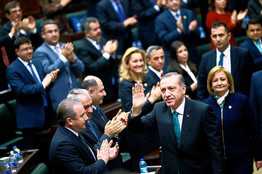By JOE PARKINSON and AYLA ALBAYRAK CONNECT
 ISTANBUL—Turkey’s government removed 20 top prosecutors from their posts and cleared the way to investigate three others, in a new sign that Prime Minister Recep Tayyip Erdogan is gaining the upper hand in a political power struggle.
ISTANBUL—Turkey’s government removed 20 top prosecutors from their posts and cleared the way to investigate three others, in a new sign that Prime Minister Recep Tayyip Erdogan is gaining the upper hand in a political power struggle.
Thursday’s moves were Mr. Erdogan’s latest response to a month-old corruption investigation led by a group of Turkish prosecutors that targets dozens of Mr. Erdogan’s allies.
But the daily public spectacle, which now appears likely to drag on for months, is also hurting Mr. Erdogan ahead of elections and risks damaging Turkey’s mbitions to join the European Union and its ties with Washington, some observers say. It also appears to be shaking investor confidence in Turkey; the lira hit a record low against the dollar on Thursday.
Enlarge Image
Prime Minister Erdogan, in Parliament on Tuesday, is trading blows with his opponents on a daily basis. umit bektas/Reuters
HSYK, the body responsible for judicial appointments, said the government reassigned the prosecutors to other localities, in a development the Turkish media called “a judicial earthquake.”
Among them were several who spearheaded the corruption probe. The judges didn’t respond publicly.
In Ankara, Justice Minister Bekir Bozdag permitted a criminal investigation to be opened into three prosecutors at the center of the corruption probe. The prosecutors didn’t make any public statements in response.
The moves came hours after the Turkish press reported that police commanders loyal to Mr. Erdogan refused to carry out prosecutors’ orders to conduct operations on more corruption cases targeting the premier’s allies, including graft charges against his son Bilal. The Justice Ministry couldn’t be reached for comment.
Mr. Erdogan has said the wide-ranging probe—in which dozens of his allies were arrested and more than 20 charged with money laundering, bribery and zoning law infractions—is a foreign-backed “judicial coup.”
But Thursday’s developments show how the premier’s purge of senior officials in the police and judiciary has appeared to block the enforcement of fresh investigations of his allies.
Since the investigation erupted, he has replaced more than 2,000 police officers with government appointees. He has also moved loyalists into vital posts in the judicial body responsible for appointments and has proposed legislation to cement its control of that body.
The struggle stems from a public spat between Mr. Erdogan and Fethullah Gulen, an Islamic cleric and a former ally who now lives in Pennsylvania. Mr. Gulen—who moved to the U.S. in 1999 citing health reasons at a time he faced trial on charges of seeking to topple Turkey’s secular order—has millions of followers in the country.
Observers say the extended tussle could hurt Mr. Erdogan in a municipal poll on March 30 and during a presidential poll next year, as well as damage relations with the European Union and the U.S.
“Erdogan has won the last couple of rounds of this battle, but this success comes at a significant cost domestically and internationally,” said Sinan Ulgen, chairman of the Center for Economics and Foreign Policy Studies, an Istanbul-based think tank. “We still don’t know whether voters will back the government strategy of characterizing this as a judicial coup against the government.”
The European Parliament’s committee on foreign affairs on Thursday offered the latest in a series of warnings from Brussels that Ankara’s moves risk rolling back EU-backed reforms and threaten the independence of the judiciary.
In Turkey, the main opposition party on Thursday rejected the government’s proposal to change the constitution in a way they say would tighten its controls on the judiciary. That means the AKP will have to push through its own amendment despite the efforts of President Abdullah Gul to sponsor a bipartisan bill—potentially deepening the sense of political polarization.
The opposition also on Thursday accused the Ministry of Justice of refusing to pass police documents to lawmakers, in a bid to cover up alleged evidence of corruption.
Still, opinion pollsters predict support for Mr. Erdogan’s Justice and Development Party, or AKP, has likely declined by a few percentage points, but say it comfortably remains Turkey’s most popular party, with over 40% support.
via Turkey Removes Prosecutors Behind Probe of Erdogan Allies – WSJ.com.
